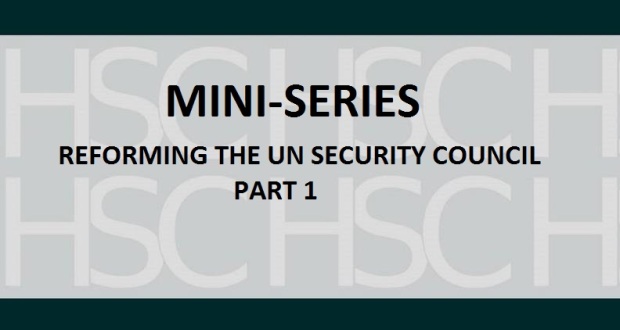June 9th, 2015
By Michelle McKenna – Senior Fellow
Reform of the Security Council is something that has been talked about almost constantly since the United Nations was founded. Since its founding in 1945, the Security Council has only undergone one reform – the addition of 4 new non-permanent members in 1965. This is despite 142 new countries having joined the organisation since 1945. The issue of Security Council reform is particularly prevalent approaching the 70th anniversary of the UN in October this year.
When the UN was formed, 22% of its members were in the Security Council; now that figure lies at only 8%. This has led to convincing arguments that the Security Council is not representative, with only 15 of 193 members represented on it. This is particularly even truer when the matter of the permanent members is considered. Permanent seats on the Security Council were awarded based on the major powers in 1945 that won the Second World War. But not all of these states are major powers in the world anymore. Discussion on this point particularly focuses around the membership of the United Kingdom and France. Some believe that there should only be one permanent seat held in Europe and that should be held by the European Union as a whole. No permanent seats are held by African states, despite representing a much larger proportion of the world population than Europe does. The Security Council needs to be reformed to become more representative of the world today and not the way it was in 1945.
The Security Council also needs to become more legitimate. The lack of representation on the Council combined with the veto power held by the permanent members is harming its perceived legitimacy. The conflict in Syria is a prime example of the Security Council failing, with the UN unable to act in the face of grave atrocities due to the threat of veto from Russia. This has led many to suggest that the veto power should be restricted or abolished altogether. That would undoubtedly improve the legitimacy of the Council through removing the concentrated power, but would not necessarily make the Council more accountable. Many decisions of the Council continue to be taken in secret and without allowing the states whose interests are most affected to participate. The Council thus needs to improve its working methods as well in order to become more accountable and legitimate.
Ten years on from the World Summit in 2005 we are yet to see any concrete proposals for Security Council reform emerge. This is because substantive reform of the Security Council is not easy: it requires an amendment to the UN Charter. This needs a two-thirds majority in the General Assembly and a two-thirds majority in the Security Council, including the affirmative votes of all 5 permanent members, which is proving particularly problematic with achieving reform. Even if a majority of states were to agree on a comprehensive plan for reform and present it before the General Assembly – something which is yet to happen – if one of the permanent members believes it is not in their interests then they could veto it and the whole reform can fall down just on the negative vote of one state. This is undoubtedly what would happen if a proposal to remove the veto were ever tabled and highlights the perverse nature of power in the Security Council in that one of the permanent members can veto removal of the veto, again demonstrating the inherent legitimacy issue in the UN.
Twice a week for the next 4 weeks, the Human Security Centre will be publishing a series of issues analysing the need for reform of the Security Council. This mini-series will look at the risks of failing to reform the Security Council, the benefits of reforming the Security Council, challenges to reforming the Security Council and a number of concrete proposals of how the Council can actually be reformed.
 Human Security Centre Human Rights and International Security Research
Human Security Centre Human Rights and International Security Research




